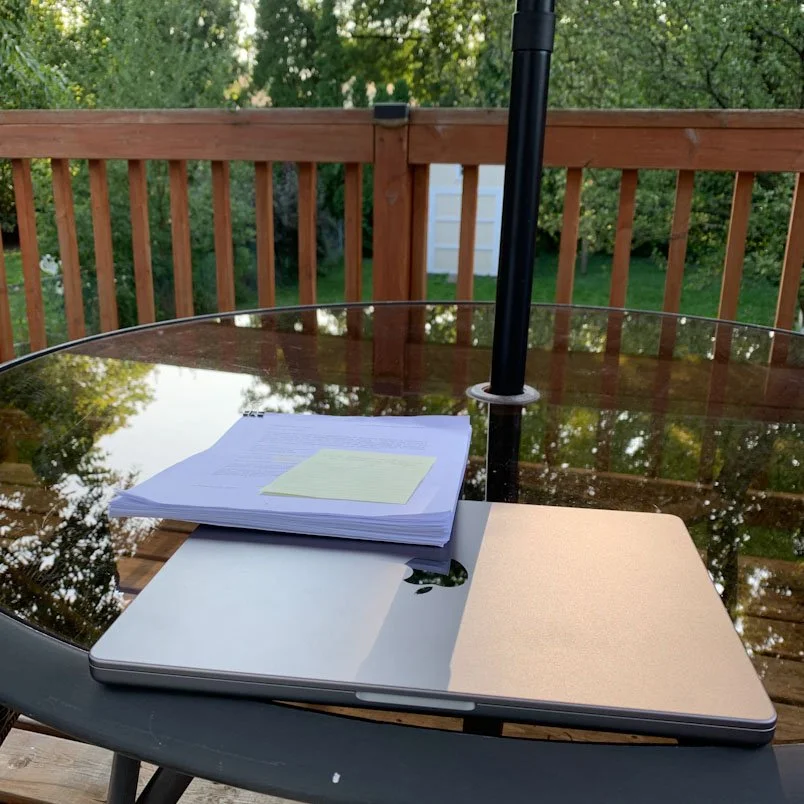How to Change Your Life in 15 Minutes A Day
If you’ve read some of my posts you might recall me referring to how I wrote and self-published three devotional books in under a year by writing 15 minutes a day. This 15 minutes a day technique, which was introduced to me by the Christian Book Academy, has fundamentally changed how I do things in life. I’ll circle back to this in a bit.
Some other things I’ve managed to accomplish since I’ve learned about this 15 minute a day technique is to play basic chords on the guitar (I’ve been trying to learn since 2011), and play some songs on the piano. When I applied this to my pottery practice, I made two tea sets in 30 days, something I hadn’t accomplished in the 16 years of taking classes.
How did I find the time?
When I reflected on it, I realized that I wasn’t spending my “free” time where I really wanted to spend it.
In 2021 I joined Matt Tommey’s Created to Thrive mentorship program to start making the transition from hobbyist to professional ceramic artist. One of the things they teach is about planning your ideal schedule. I work full time, but usually had the rest of my evenings free, I had a ton of time to work on art, right? This is great! I’ve got about 15-20 hours a week I can work on this!
Cue reality check.
After several months, nothing seemed to change. I was completing the exercises, going through all the lessons, but something didn’t add up and I didn’t know why. Then in one of the live lessons, Matt Tommey mentioned doing a time audit to identify where are you really putting your time. Well of course I was giving myself 15-20 hours a week to improving my pottery skills, I must be getting better, aren’t I?
Nope.
I did the time audit, recording on paper how I spent my time for a week, in about 15-30 minute increments. (You could also do this using an electronic calendar; I’m a pencil and paper kinda gal.) This was during the pandemic, so there wasn’t really anything else I was doing, I must have spent a ton of time working on my pottery and art, right?
I wasn’t.
I was spending maybe five hours a week on it at most. The rest of the time was spent watching TV; “unwinding” from a long and stressful day; filling my head with mindless fluff of advertisers and news or scrolling social media, or playing games on my iPad (Darn you CandyCrush!!) Ugh. Three of the five hours was spent at pottery class most weeks, so really, I was only working on my art (and art business) for two hours a week at best. At that rate, I’d never make any progress.
So I became more intentional about my time. That coincided with when I heard about the 15 minutes a day writing habit through the Christian Book Academy that mentioned above. My writing productivity increased dramatically, so I decided to apply it to other things in my life. I carved out little 15 minute sessions in my day where I had extra time I could go longer if I wanted to, and got to work.
I took up reading again. I took up the guitar and piano again, investing in lessons. I spent time working in clay, drawing, painting, and working on other art projects. I spent it working on the various courses I had enrolled in over the years, learning concepts and applying them to my life and art. And I still found time to watch an hour or two of TV (intentionally), down from the 5-6 hours A DAY I had been watching it. (NASCAR doesn’t count — I keep that on in the background ;) )
So as promised, here’s the step-by-step process to carve out 15 minutes a day.
1. Do a time audit for a week:
record how you spend your day, from the time you wake up until you go to bed. Record where you spend your time and what you are doing. You’ll be surprised to see how much of it is spent on our devices (they’ll even record the time for you.)
2. Assess where you are spending your time:
are you spending most of your time doing things you want to be doing or where you want to be focusing? This will be different for people in different seasons of their lives. For example, families with young children will have a lot of their time and energy spent taking care of them; that makes absolute sense for that season. Others without children or parents to care for will likely have more free time available. Either way, you should still be able to find 15 minutes a day for yourself.
3. Identify where in the day you have the most energy:
are you a morning, afternoon, or an evening person? Wherever you have the most energy, select that time to carve out 15 minutes. If you’re a morning person, get up 15 minutes earlier when it’s quiet and there are fewer distractions. This generally means you need to go to bed a little earlier, but it’s worth it! This will be your 15 minute time slot. Be courteous though; if you’re taking up drumming, save the full practice for later in the day, and only use your practice pad in the morning ;)
4. Commit to one item you want to work on and make a plan for your time:
Whether it is more reading, more walking in nature, more writing, art, cooking — whatever your passion is, where you want to focus your time — commit to spending 15 minutes a day on that one thing. Spend one session a week planning how you are going to spend your 15 minute blocks that week. Planning makes things easier, so you’re not spending the 15 minute blocks trying to come up with what you want to do.
For example if you’re going to work on a new quilting project, day one may be 15 minutes of reading the pattern; day two selecting and preparing the fabrics; day three cutting the fabrics; day four piecing the fabrics into strips; day five assembling the quilt block; day six can be used as a buffer day to finish any work that didn’t get done in the first five days. Over several weeks, you’ll have a full quilt top! Well done!
5. Give yourself a day of rest each week:
reflect on what you’ve accomplished, and consider what you’d like to do next week. Don’t measure yourself by what your finished goal is, but measure your progress from where you’ve started. You’ll be amazed at what you can accomplish with even such a small amount of focused time.
You can learn and do just about anything using this process. By committing to 15 minutes a day and practicing it faithfully, you will have much more success. You are welcome to do more than 15 minutes if you have the extra time and energy, but allow yourself the grace to stop if you need to after 15 minutes.
Some people may decide that they don’t like to do things broken up in smaller chunks and they have a larger block of time they want to use to focus on their work. In that case, collect the six 15 minute sessions in one hour and a half long block. The only thing I don’t recommend for this is when you’re learning an instrument or a physical skill that involves developing muscle memory, as you will benefit more from the small amounts of repetitive practice each day. By all means take that 90 minute block one day a week if you’ve got it, but also use 15 minutes a day to practice your skills, developing muscle memory, and creating a good practice habit.
That is how you can change your life, in only 15 minutes a day. If you’d like, I’ve put together a PDF document - 3 Steps to Prioritize Your Schedule, where you can do a time audit while incorporating the “Big Rocks” theory, popularized by Stephen Covey. (I’ll dive into that in another blog.) I’ve included the link below:
Let me know if you’ve given it a try - I’d love to hear what you accomplish!

